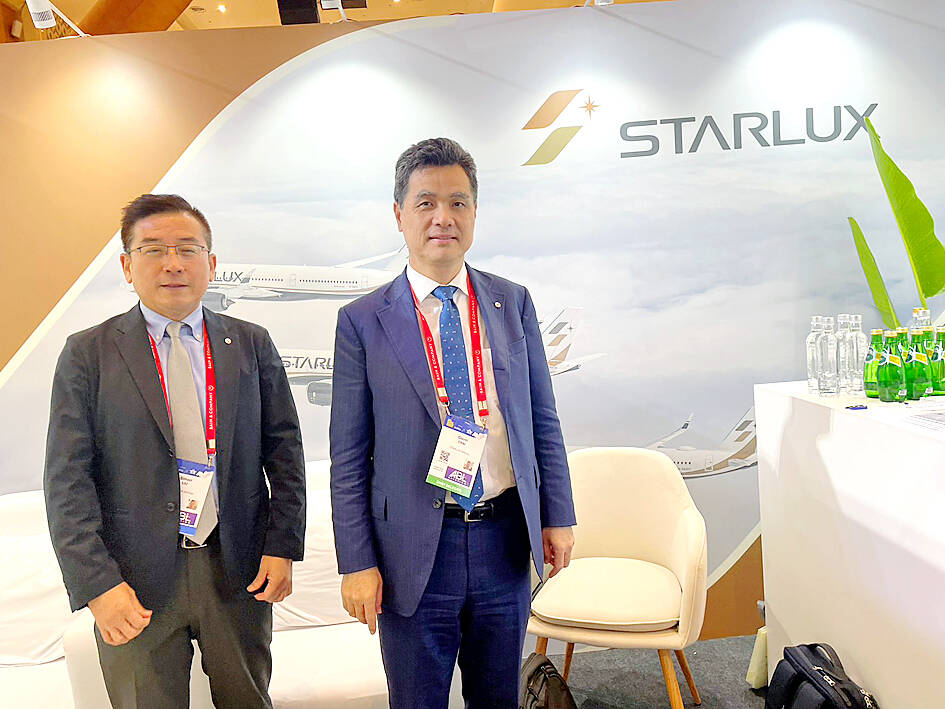Travelers are delaying trips to the US to the end of the year as a direct consequence of the economic uncertainty caused by US President Donald Trump’s tariffs, Starlux Airlines Co (星宇航空) said yesterday.
“This summer, we see the impact already,” Starlux chief executive officer Glenn Chai (翟健華) said in an interview.
“People are feeling uncertain about future economic growth. They are still booking, but they postpone to the fourth quarter,” he added, referring to leisure bookings.

Photo: CNA
The airline said the disruption to business is a headwind, but one that is likely to only be felt short-term as it bets the global dispute over duties would be resolved ahead of next year’s US midterm elections.
The evolving trade situation only adds to the challenges for the aviation industry emanating from Trump’s White House. Additional difficulties include the administration’s attacks on Harvard University, which have since broadened out to imposing restrictions on international students.
Nevertheless, the Taipei-based airline, which launched amid the COVID-19 pandemic in 2020, has grown rapidly. All of its long-haul flights are to the US, which remains a key market, helping the carrier develop a broader appeal to customers including transit travelers.
On average, 70 percent of Starlux’s flights in business class are through cash bookings, fueled by the strong flow of corporate travel largely underpinned by the semiconductor and broader technology industry, Chai said at the International Air Transport Association’s annual meeting in New Delhi, India.
With long-haul flights from Taipei to Los Angeles, Seattle and San Francisco already, the carrier this week launched its fourth US route to Ontario, California. It is planning to start flights to Phoenix early next year to meet the increased travel demand created by Taiwan Semiconductor Manufacturing Co’s (台積電) more than US$165 billion investment in Arizona.
The next phase of expansion would include an inaugural flight to Europe next year, and at least two more US destinations, with New York and other East Coast routes under consideration. However, getting the necessary new aircraft on time remains a challenge for the entire aviation industry.
The airline is being forced to dial back its growth expectations this year with Airbus SE advising it would deliver fewer aircraft than promised, and delays on the remaining jets it is to produce.
Starlux, which has a fleet of 28 all-Airbus aircraft with new-generation fuel-efficient engines, had planned to grow its capacity by as much as 50 percent by the end of this year compared with last year, but that is more likely to be closer to 20 percent to 30 percent, Chai said.
It has three more aircraft to be delivered this year, an A350-1000 and two A330neos joining two A350-900s already delivered, four widebodies short of what it had initially planned to receive, he said.
Starlux expects delivery of a dozen Airbus jets next year.

With an approval rating of just two percent, Peruvian President Dina Boluarte might be the world’s most unpopular leader, according to pollsters. Protests greeted her rise to power 29 months ago, and have marked her entire term — joined by assorted scandals, investigations, controversies and a surge in gang violence. The 63-year-old is the target of a dozen probes, including for her alleged failure to declare gifts of luxury jewels and watches, a scandal inevitably dubbed “Rolexgate.” She is also under the microscope for a two-week undeclared absence for nose surgery — which she insists was medical, not cosmetic — and is

CAUTIOUS RECOVERY: While the manufacturing sector returned to growth amid the US-China trade truce, firms remain wary as uncertainty clouds the outlook, the CIER said The local manufacturing sector returned to expansion last month, as the official purchasing managers’ index (PMI) rose 2.1 points to 51.0, driven by a temporary easing in US-China trade tensions, the Chung-Hua Institution for Economic Research (CIER, 中華經濟研究院) said yesterday. The PMI gauges the health of the manufacturing industry, with readings above 50 indicating expansion and those below 50 signaling contraction. “Firms are not as pessimistic as they were in April, but they remain far from optimistic,” CIER president Lien Hsien-ming (連賢明) said at a news conference. The full impact of US tariff decisions is unlikely to become clear until later this month

GROWING CONCERN: Some senior Trump administration officials opposed the UAE expansion over fears that another TSMC project could jeopardize its US investment Taiwan Semiconductor Manufacturing Co (TSMC, 台積電) is evaluating building an advanced production facility in the United Arab Emirates (UAE) and has discussed the possibility with officials in US President Donald Trump’s administration, people familiar with the matter said, in a potentially major bet on the Middle East that would only come to fruition with Washington’s approval. The company has had multiple meetings in the past few months with US Special Envoy to the Middle East Steve Witkoff and officials from MGX, an influential investment vehicle overseen by the UAE president’s brother, the people said. The conversations are a continuation of talks that

CHIP DUTIES: TSMC said it voiced its concerns to Washington about tariffs, telling the US commerce department that it wants ‘fair treatment’ to protect its competitiveness Taiwan Semiconductor Manufacturing Co (TSMC, 台積電) yesterday reiterated robust business prospects for this year as strong artificial intelligence (AI) chip demand from Nvidia Corp and other customers would absorb the impacts of US tariffs. “The impact of tariffs would be indirect, as the custom tax is the importers’ responsibility, not the exporters,” TSMC chairman and chief executive officer C.C. Wei (魏哲家) said at the chipmaker’s annual shareholders’ meeting in Hsinchu City. TSMC’s business could be affected if people become reluctant to buy electronics due to inflated prices, Wei said. In addition, the chipmaker has voiced its concern to the US Department of Commerce